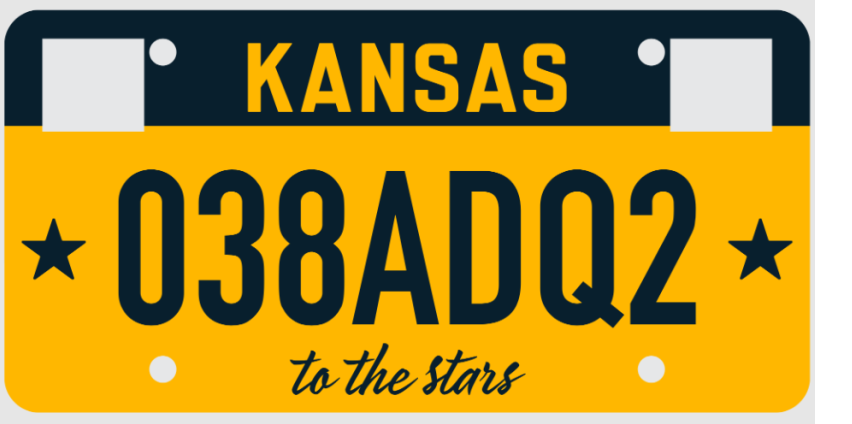Free Kansas License Plate Lookup
Search and lookup any KS license plate and get a free vehicle report
Kansas (KS) is known for its diverse landscape and agricultural heritage, but its car market is equally dynamic and noteworthy. The state boasts a wide range of used vehicles, providing buyers with plenty of options across various makes and models. Kansas’ central location in the United States contributes to a steady influx of cars from different regions, ensuring a diverse selection for consumers seeking both reliability and variety in their automotive choices.
However, purchasing a used vehicle in Kansas can come with its own set of challenges. Even cars that seem well-maintained on the surface can have hidden issues that only become apparent after purchase. This can lead to unexpected repair costs and frequent visits to the mechanic, turning what appeared to be a good deal into an expensive endeavor. As with any used vehicle market, it’s crucial to be cautious and thorough in your research to avoid these potential pitfalls.
To mitigate the risks associated with buying a used car in Kansas, conducting a comprehensive license plate lookup is essential. Utilizing a reliable Kansas license plate lookup tool provides detailed insights into a vehicle’s history and condition, including past accidents, ownership records, and potential mechanical issues. This valuable information helps buyers make informed decisions, ensuring a smoother and more secure car-buying experience.
Table of Contents:
- What information can you get from a Kansas license plate lookup?
- What is a Kansas license plate?
- How do I get a license plate in Kansas?
- Can I transfer my Kansas license plate to another vehicle?
- How can I find the owner of a license plate in Kansas?
- Can you look up vehicle records and history by VIN in Kansas?
Kansas DOR Contact:
 Telephone: 785-296-3621 select Option 2 then Option 2 again
Telephone: 785-296-3621 select Option 2 then Option 2 again
Hours of Operation: Monday – Friday, 8 a.m. – 4:45 p.m.
VinCheckPro offers an excellent service for checking Kansas license plates, delivering extensive information on registered vehicles in the state. This tool equips users with crucial details, facilitating a thorough assessment of a vehicle’s history before making a purchase.
- Accidents or Damages: This crucial section covers any incidents affecting the vehicle, including collisions and damage from external factors like vandalism or fallen objects.
- Odometer Indications: Easily compare reported mileage against the actual odometer reading to ensure accuracy and uncover potential discrepancies.
- Recalls & Defects: Stay informed about any recalls or known defects associated with the specific make and model of the vehicle.
- Lien & Repossession Records: Understand if the vehicle has been used as collateral in a loan, helping you avoid financial entanglements.
- Theft & Recovery Records: Discover if the vehicle has been reported stolen and subsequently recovered, providing critical insight into its history.
- Flood, Hail, and Fire Damage: Learn about any damage resulting from natural disasters, which can have long-term implications for the vehicle’s integrity.
- Mileage Rollback: Guard against odometer fraud by verifying the reported mileage against historical records.
- Sale history, estimated ownership costs, and market value: This information provides valuable insights into the vehicle’s past, potential future expenses, and current market value.
- Vehicle Specifications: Ensure that all standard equipment, including body color and tires, align with the vehicle’s description.
- Previous Use: Identify if the vehicle has been utilized for personal, taxi, or police purposes, offering insight into its past usage.
- Service, Inspection, and Registration History: Gain a comprehensive overview of the vehicle’s maintenance and registration records, providing valuable context for its overall condition.
Our Kansas license plate lookup service simplifies obtaining detailed car reports, making the vehicle buying process more informed. Try our reliable service today by requesting your personalized report and receiving it promptly!
 A Kansas license plate is a rectangular metal plate attached to both the front and back of a vehicle. It acts as the vehicle’s visual identifier and indicates it is registered in Kansas. These plates are distributed by the Kansas Department of Revenue’s Division of Vehicles (DOV) and must be renewed periodically. Generally, only a single rear license plate is issued per vehicle.
A Kansas license plate is a rectangular metal plate attached to both the front and back of a vehicle. It acts as the vehicle’s visual identifier and indicates it is registered in Kansas. These plates are distributed by the Kansas Department of Revenue’s Division of Vehicles (DOV) and must be renewed periodically. Generally, only a single rear license plate is issued per vehicle.
Besides the license plate number, Kansas plates may feature additional details, such as the county where the vehicle is registered, the registration expiration date, and special designs or logos for specific vehicles or causes.
The state offers various license plates for different vehicle types, including standard passenger cars, trucks, motorcycles, trailers, and more.
-
- Personalized License Plates – Kansas residents can customize their license plate with up to six characters, choosing from a wide variety of letters, numbers, and symbols.
- Educational Institution License Plates – the distinctive plates offer a way for drivers to easily recognize each other as alumni of a particular Kansas college or university
- Other Organizational Distinctive License Plates – offered to individuals who want to show their support for various groups and special interest organizations
- Military Distinctive License Plates – offered for Kansas residents who have served or are currently serving in the military
- Other Distinctive License Plates
State law mandates that each personalized plate must be unique within Kansas. Therefore, residents need to verify the availability of their desired personalized plate before submitting an application.
- Vehicle Purchase: When you buy a new or used vehicle from a dealership, they typically help you with the registration process, including providing the necessary license plates.
- Gather Required Documents: Make sure you have the following documents ready:
- Proof of Ownership: This could be the vehicle’s title, Manufacturer’s Statement of Origin (MSO), or a bill of sale, depending on your situation.
- Proof of Insurance: You must have valid auto insurance for the vehicle you’re registering.
- Completed Application: Fill out the Application for Certificate of Title and/or Registration (Form TR-212a), which is available on the Kansas Department of Revenue’s website.
- Visit Your County Treasurer’s Office: Find your local County Treasurer’s Office, which handles vehicle registration in Kansas. The nearest office can be located on the Kansas Department of Revenue’s website.
- Complete Necessary Forms: At the County Treasurer’s Office, you’ll need to complete the required application forms based on your specific situation. The main form is the Application for Certificate of Title and/or Registration (Form TR-212a).
- Provide Proof of Insurance: Show valid proof of insurance coverage for the vehicle, ensuring it meets Kansas state requirements.
- Pay Fees and Taxes: Be ready to pay the necessary registration fees, taxes, and any specialty plate fees, which vary based on factors such as the type and value of the vehicle. Payment methods may include cash, check, or credit/debit card, so check with your County Treasurer’s Office for accepted forms of payment.
- Receive License Plates: Once your application is approved, you will receive a set of Kansas license plates for your vehicle. The County Treasurer’s Office will provide instructions on how to affix the plates to your vehicle.
- Renew Registration Annually: Keep in mind that vehicle registration in Kansas must be renewed annually before the expiration date. You will receive a renewal notice with instructions.
Yes, you can generally transfer your Kansas license plate to another vehicle if certain conditions are met. Here are the steps to transfer a license plate to a different vehicle in Kansas:
- Meet Eligibility Requirements: To transfer your license plate, both the vehicle you are removing the plate from (the old vehicle) and the vehicle you are transferring it to (the new vehicle) must meet specific criteria. Typically, the old vehicle must no longer be in your possession, and the new vehicle must be registered in your name.
- Gather Required Documents:
- The title or Manufacturer’s Statement of Origin (MSO) for the new vehicle, properly signed over to you if applicable.
- The current registration for both the old and new vehicles.
- Proof of insurance for the new vehicle.
- A completed Application for Certificate of Title and/or Registration (Form TR-212a), available from the Kansas Department of Revenue’s website.
- Visit Your County Treasurer’s Office: Go to your local County Treasurer’s Office, which handles vehicle registrations in Kansas. Provide the necessary documents and inform the staff that you want to transfer your license plate to the new vehicle.
- Pay Transfer Fees: Pay any required transfer fees, taxes, and registration fees. These fees may vary depending on the type of vehicles and other factors.
- Receive New Registration: If the transfer is approved, you’ll receive a new registration for the new vehicle with the transferred license plate. The old vehicle’s registration will be canceled.
- Affix the Plate: Follow the instructions provided by the County Treasurer’s Office on how to attach the license plate to the new vehicle.
Please note that eligibility and requirements for license plate transfers can vary based on individual circumstances and the specific vehicles involved. It’s important to contact your local County Treasurer’s Office or visit the Kansas Department of Revenue’s website for detailed information and to ensure you meet all the necessary criteria for a successful license plate transfer.
In Kansas, as in many states, accessing personal information about a license plate owner is limited to specific purposes such as law enforcement or authorized government use. This means that private individuals cannot obtain this personal information without a valid reason.
If you have a legitimate need to obtain this information, for instance for a legal matter, you can typically request it through the Kansas Division of Vehicles. However, you may need to provide documentation and show a valid reason for your request. Remember that privacy laws and regulations vary by state, and obtaining personal information without authorization can be illegal.
For general purposes, such as identifying a vehicle’s make and model, you can use online license plate lookup services that provide public information about vehicles. These services often provide details like the vehicle’s make, model, year, and sometimes its history, but they do not include personal information about the owner.
Always ensure that your use of any information obtained through such services complies with state and federal laws, and respect individuals’ privacy rights. If you have a specific, legitimate reason to access personal information associated with a license plate in Kansas, it’s best to consult with legal authorities or law enforcement for guidance on how to proceed legally.
You can perform a vehicle history lookup in Kansas using the Kansas VIN Check feature on VinCheckPro.com. This service allows you to gather a range of details about a vehicle’s past, such as its title status, accident records, mileage readings, recall history, and more, all by inputting its unique Vehicle Identification Number (VIN).
Alternatively, you might want to explore government databases to uncover additional information regarding a vehicle’s background in Kansas. Some governmental bodies, like the Kansas Division of Vehicles, offer online platforms and tools to access pertinent vehicle-related data and services.
To utilize VinCheckPro.com’s Kansas VIN Check:
- Go to the VinCheckPro website at vincheckpro.com.
- Find the search bar on the homepage.
- Enter the VIN of the vehicle you’re interested in checking.
- Click on the “Check VIN” or a similar option to start the search.
- Review the detailed vehicle history report provided by VinCheckPro.
For government database alternatives, you can visit the official websites of the Kansas Division of Vehicles or the Kansas Department of Revenue. These government portals may provide additional services and resources for obtaining vehicle history information, registration particulars, and related data.